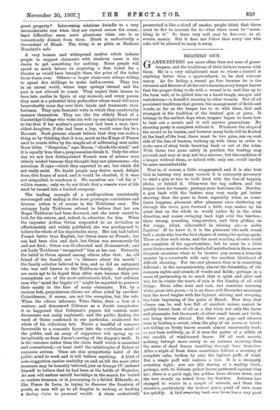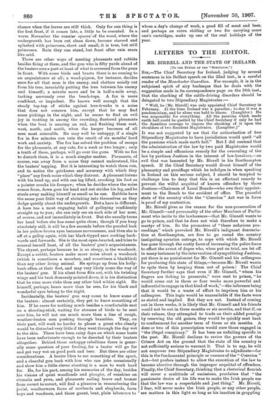BEATERS' GUN.
GAMEKEEPERS are more often than not sons of game- keepers, and the traditions of their fathers remain with them. He is a very enlightened man to whom a kestrel is anything better than a sparrowhawk, to be shot without mercy. As for letting a weasel go. free because he is the cleverest and fiercest of all the rat's enemies, every keeper knows that the proper thing to do with a weasel is to nail him up to the barn wall, or to gibbet him on a hazel-bough, meagre and malodorous,—a dreadful warning to other weasels. But of all persistent traditions that govern the management of fields and woods, so far as the keeper has to do with them, first and strongest is the tradition of the beaters' gun or guns. It belongs to the earliest days when keepers began to learn how to beat out a covert, and it will survive generations. No shooting party is complete without it. Whatever the shape of the covert to be beaten, and however many birds will be flushed at the head of the beat, there must be two guns, one on each side of the line of beaters, walking up with them in order to make sure of stray birds breaking back or out at the sides. With those two guns safely in position the beating may proceed, and may or may not be a success ; but the condition of a keeper without them, or indeed with only one, could hardly be more uncomfortable.
That is, of course, a little exaggerated, and it is also true that in beating very many coverts it is extremely necessary to send a gun or two to walk level with the line of tapping sticks, or behind it. Otherwise the bag suffers, and the keeper loses his temper; perhaps your host loses his. Besides, a gun back with the beaters may very easily get better shooting than the guns in front, especially when, as some- times happens, pheasant after pheasant rises clattering up through the trees, goes forward a little way, makes up his mind that on the whole he would rather fly in the other direction, and comes swinging back high over the beeches ; three strong, sounding wing-strokes, and then gliding on flat wings, silent, silhouetted in shining air,—a noble fugitive! If he knew it, it is the pheasant who sails round half a circle who has the best chance of seeing the spring again. Three or four such shots, and the most exacting shooter could not complain of his opportunities ; but he must be a little more than a mere shooter to find a full satisfaction in those more frequent occasions when to be beaters' gun means a leisurely saunter by a covertside with only the smallest likelihood of difficult shooting. For the real pleasure then is in something different ; in the companionship, almost the friendship, of the common sights and sounds of woods and fields ; perhaps in a sense of partnership in so much that is quiet and alive and wet, for in winter the touch of rain is the kinship of all wild things. Frost after mist and rain, and sunshine warming white grass into green,—it is on those still December mornings that the wood tingles with the lightest stirring and creeping, the faint beginning of the pulse of March. How deep that silence can be, and bow full of smallest noises, cannot be quickly learnt, least of all on a day when not only the hares and pheasants, but thousands of other small beasts and birds, are being driven abroad. But there are gaps and silences even in beating a covert, when the plop of an acorn or beech- nut falling on frosty leaves sounds almost unnaturally loud ; or you turn suddenly, as if it were the patter of a rabbit, at the crackle of wind-tossed leaves. Of all such sounds, nothing belongs more surely to an autumn morning than the noise of dead leaves tumbling through bare branches. After a night of frost there sometimes follows a morning of complete calm, broken by only the lightest puffs of wind. But a single puff will undress a tree. It is a strangely arresting sight ; you are idly staring at a sapling birch, perhaps, with its delicate yellow leaves patterned against blue air; there is a quick sigh, the golden dress shivers down, and the tree stands up naked from the bracken. Autumn has changed to winter in a couple of seconds, awl from the shooter's, particularly the beaters' gun's, point of view, none too quickly. A bird swerving back over trees has a very good
chance when the leaves are still thick. Only for one thing is the first frost, if it comes late, a little to be resented. In a warm November the sunnier spaces" of the wood, where the undergrowth has been cut clean down, become starred and splashed with primroses, short and small, it is true, but still primroses. Rain they can stand, but frost after rain sears like acid.
There are other ways of meeting pheasants and rabbits besides firing at them, and the gun who is fifty yards ahead of the beaters sees a part at least of what is screened from the guns in front. With some birds and beasts there is no coming to an acquaintance at all; a wood-pigeon, for instance, decides once for all that man is the enemy, and clatters noisily out from his tree, invariably putting the tree between his enemy and himself ; a minute more and he is half-a-mile away, tacking nervously over the beech-tops. A fox is more confident, or impudent. He knows well enough that the steady tap-tap of sticks against tree-trunks is • a noise that does not concern him, except that he may find some pickings in the night, and he seems to find an evil joy in trotting in among the crowding, flustered pheasants when the beat is nearing an end, and flushing them east, west, north, and south, when the keeper becomes of all men most miserable. He may well be unhappy, if a single fox in five minutes can ruin the result of six months' hard -work and anxiety. The fox has solved the problem of escape for the pheasants, at any rate, for a week or two longer ; only a tenth of them, perhaps, will go over the guns; With no fox to disturb them, it is a much simpler matter. Pheasants, of course, run away from a noise they cannot understand, like the beaters' tapping. But it is interesting to watch them run, and to notice the quickness and accuracy with which they "place" any fresh noise which they distrust. A pheasant listens with his head up, and with one leg lifted, crooking his foot as a pointer crooks his forepaw; when he decides where the noise comes from, down goes his head and out strides his leg, and he steals away making himself as small as he can. Rabbits have the same poor little way of shrinking into themselves as they dodge quietly about the undergrowth. But a hare is different. A hare has a most engaging habit of galloping confidently straight up to you; she can only see on each side of her nose, of course, and not immediately in front. But she usually turns her head before she has come quite close; though if you keep absolutely still, it will be a few seconds before the puzzled look in her yellow-brown eyes becomes nervousness, and then she is off at a gallop again, with her black-tipped ears cocking back- wards and forwards. She is the most open-hearted, and tries to Conceal herself least, of all the beaters' gun's acquaintances. The shyest, perhaps because he is so sleepy, is the woodcock. Except a rabbit, beaters make more noise about a woodcock (which is sometimes a moorhen, and sometimes a blackbird) than any other living animal. He springs up from his holly- bush often at their feet, and may very likely come the way of the beaters' gun. If his silent form flits out, with his twisting wings and his beak demurely pointed down, it is his distinction that he runs more risks than any other bird within sight. He himself, perhaps, hears more than he sees, for his black and wonderful eyes belong to the night.
Incidentally, the beaters' gun may come to know some of the beaters : almost certainly, they get to know something of him. If he cares for nothing much besides a comfortable seat on a shooting-stick, waiting for streams of birds to be sent over him, he will not see much more than a line of rough, weather-beaten men pushing through brambles. They, on their part, will work no harder to please a guest who clearly would be disturbed very little if they went through the day wet
to the skin. There have been rainy days on which some hosts have been unfortunate enough to be deserted by their beaters altogether. Behind those .unhappy rebellions there is gener- ally some question of poor feeding, for a beater will go far and get very wet on good pork and beer. But there are other considerations. A beater likes to see something of the sport, and a cheerful gun back with him who can joke occasionally and show him a little clever shooting is a man to work hard for. He, for his part, among his memories of the day, besides his visions of quiet woodlands and ploughs, of sunshine on clematis and yews, and pheasants sailing brave and bronze from covert to covert, will find a pleasure in remembering the jovial, weatherworn faces of cowherds and shepherds, farm boys and woodmen, and those gaunt, bent, plain labourers to whom a day's change of work, a good fill of meat and beer, and perhaps an extra shilling or two for carrying some one's cartridges, make up one of the real holidays of the year.



















































 Previous page
Previous page